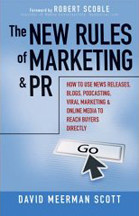I'll be writing a post-show roundup to my "sequel" appearance on The Recruiting Animal Show tomorrow, but you don't have to wait if you want to brave the waters on your own. The entire show, which addresses the merits and potential challenges of evolving a blog into a media business (or better yet, income marketing opportunities), is available online in its entirety.
Other than a technical hiccup or two, the program delivers a lively discussion with myself, a marketing specialist, two experienced recruiter-bloggers, and, of course, the undeniably talented show host, The Recruiting Animal. Listen to the show now or wait for the recap tomorrow. Either way, the show provides a glimpse into adding digital media to your marketing mix; perhaps even serving as a pre-teaser into something we have planned with one of our many strategic partners.
Incidentally, if you're still not convinced digital media is on the rise, consider that the ROO Group, another emerging leader in online video solutions for content providers, advertisers, and Web sites, has partnered with a popular morning TV show in Britain, GMTV, to launch an online video portal. The portal will also feature four additional channels including: news, showbiz, fashion, and family health.

Other than a technical hiccup or two, the program delivers a lively discussion with myself, a marketing specialist, two experienced recruiter-bloggers, and, of course, the undeniably talented show host, The Recruiting Animal. Listen to the show now or wait for the recap tomorrow. Either way, the show provides a glimpse into adding digital media to your marketing mix; perhaps even serving as a pre-teaser into something we have planned with one of our many strategic partners.
Incidentally, if you're still not convinced digital media is on the rise, consider that the ROO Group, another emerging leader in online video solutions for content providers, advertisers, and Web sites, has partnered with a popular morning TV show in Britain, GMTV, to launch an online video portal. The portal will also feature four additional channels including: news, showbiz, fashion, and family health.



















